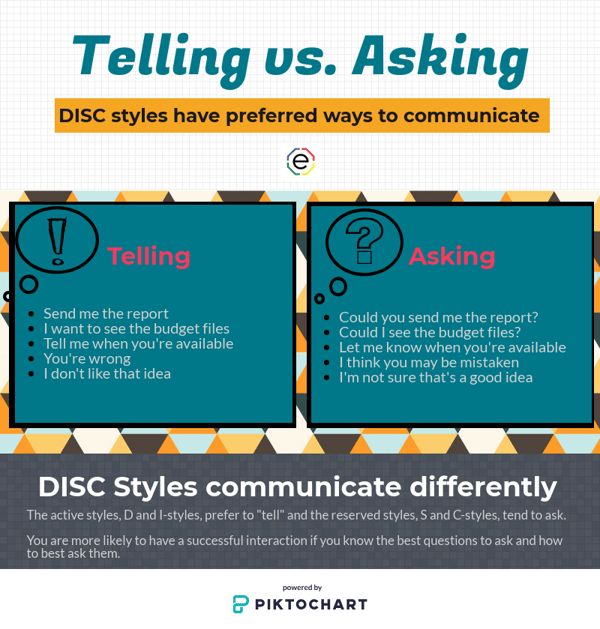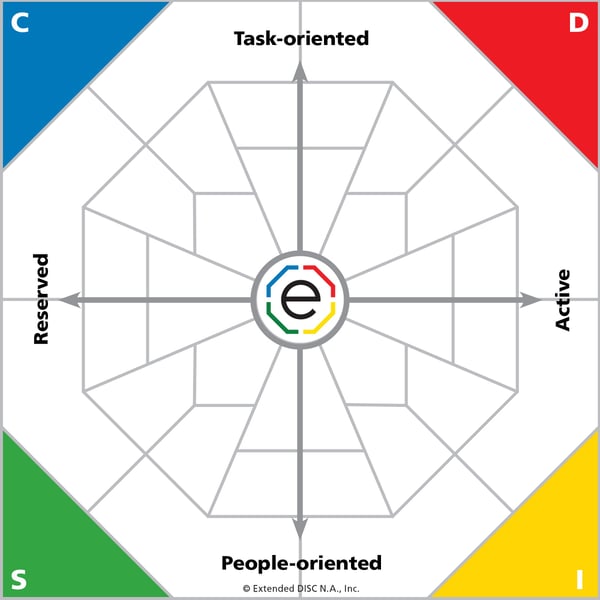I recently noticed an Instagram post on how to be more polite; in other words, stop "telling" and start "asking."
 Sounds easy enough, right? We're often told we'd get better results if we "ask" instead of "tell," but that's not always comfortable for everyone. I'm not addressing whether it's right or wrong or the most effective way, but what's more natural for us.
Sounds easy enough, right? We're often told we'd get better results if we "ask" instead of "tell," but that's not always comfortable for everyone. I'm not addressing whether it's right or wrong or the most effective way, but what's more natural for us.
There are those of us who prefer to "ask" because it feels comfortable, while others simply "tell" without even thinking about it. We normally prefer to just do what we do, right? We find it takes energy and focus if we need to be "asking" when we are more comfortable "telling".
DISC helps explain "how we do what we do"

One of the things people love about the DISC model is that it's non-judgmental. There are no good or bad categories. There are no high or low scores. Each DISC style is not better or worse; they simply have similarities and differences. If we are able to understand those preferences about others and ourselves, then we are less likely to misconstrue our interactions.
Some DISC styles are comfortable responding to being "told" what to do;" while others perceive being "told" to do something as demanding and even impolite. In addition, some of us don't respond well to being "asked," while others respond positively. The key is knowing how you prefer to "do what you do" and how others prefer "to do what they do."
Observing patterns of behavior

My instincts for asking questions is to press, but not to be a jerk about it.
John Dickerson, American journalist
DISC styles have natural preferences; some of us prefer to "ask," while others prefer to "tell." Again, we're not stating one is better than the other. Our DISC profiles help explain our most comfortable ways of doing things. We can also use DISC to identify others. We find the Active styles, D-styles and I-styles, are more inclined to "tell" you to do something, "you did it wrong so you need to fix it." The Reserved styles S-styles and C-styles, are more likely to "ask" you to do something, "I noticed a few mistakes - would you mind fixing it?" The goal of fixing the report may be the same, but how it's asked may be different.
I'm a tell-it-like-it-is kind of person...
John McEnroe, American tennis player
Next time, listen to the sentences the other person uses, whether in writing or verbally. Do their sentences tend to "tell" or "ask" you to do something? The way they use sentences gives you information to identify their main DISC style. Once you've identified their style, you can make adjustments to better interact with them and avoid misunderstandings.
Your next interaction

"Asking" and "telling" are similarly used, but the meaning and intent are not always received the same. For example, the most successful managers understand their styles and know when to make adjustments. They phrase their sentences in ways which motivate their employees because they are aware DISC styles listen and respond differently.
We can make better decisions and practice effective situational behaviors when we increase our behavioral self-awareness. If we understand the nuance between "ask" and "tell", then we are more likely to apply it in order to generate the response we want. So, the next time you're asking a question or giving a directive, consider how you ask it; that simple adjustment could be the difference between failure and success.
